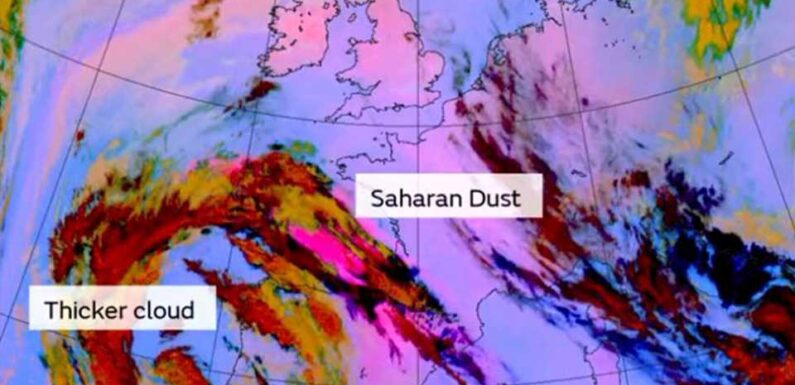
A SAHARAN dust plume blowing over the UK could trigger severe asthma attacks, experts have warned.
Vast swathes of the country could witness stunning sunsets tonight, as sand clouds fill the skies during a week of unseasonably high temperatures.
But while it could make for some pretty pictures, the dust cloud could increase the risk of people with asthma and other breathing difficulties having life-threatening reactions, according to charity Asthma + Lung UK.
This could be as mild as breathlessness and coughing, or at worst, hospitalisation or a fatal attack.
Dr Andy Whittamore, clinical lead at the charity told The Sun: "Saharan dust could pose a serious risk to people living with a lung condition, such as asthma.
“Dust and other types of air pollution are a well-known trigger for people with lung conditions.
Read more on asthma
My son’s asthma is so bad I’m terrified his journey to school could kill him
Map reveals most dangerous asthma hotspots in England – are you at risk?
"Toxic air can leave people struggling for breath, worsen symptoms, cause an asthma attack or flare up of their lung condition."
Dr Andy urged people to take steps to reduce the impact of dust and air pollution, which included staying indoors.
"Firstly, if you have a preventer (or maintenance) inhaler, you should take it every day as prescribed, even when well.
"You should also keep your reliever (or rescue) inhaler with you in case of emergencies, so you can use it quickly if your symptoms get worse.
Most read in Health
Heat health alert upgraded to amber in 8 areas as Met Office predicts 32C highs
How to spot skin cancer using the 'ugly duckling rule' amid UK heatwave
Two thirds of under-50s could be living with undiagnosed killer condition
Nine tips to keep your kids feeling 10/10 as they head back to class
"We’d also advise staying indoors, if possible, when dust levels are particularly high.”
It comes as an amber alert across the whole of England, excluding the North East, from 2pm on Monday to 9pm on September 10.
Ahead of temperatures hitting a predicted 32C this week, the UK Health Security Agency has warned health and social care services could come under "significant" pressure.
According to a forecaster from the Met Office, the elevated Saharan dust cloud is passing north east through the UK.
It brought a spectacular sunsets yesterday evening (September 4) and is expected to do the same tonight.
Marco Petagna, a meteorologist at the Met Office, said in a tweet at yesterday: "The Copernicus forecast showing an elevated Saharan dust plume passing N and E across the UK next 48hrs.
"Watch out for beautiful red sunsets this evening and tomorrow evening."
Air pollution is the presence of pollutants (including dust) in the air that are dangerous to humans health.
Dirty air is a one of the major triggers for the people with asthma.
Previous reviews suggest suggests that indoor and outdoor air pollution can cause asthma.
More than five million people in the UK have asthma, and over 1.3million are living with diagnosed COPD – an umbrella term for a group of lung conditions which make it harder to breathe.
Read More on The Sun
EastEnders legend set for exit after 38 years
Adam Peaty in horror punch-up with Team GB teammate over ex-girlfriend jibe
The Department for Environment and Rural Affairs data showed high levels of air pollution in the south of England on Wednesday, moving to the south west on Thursday and Friday.
What is Saharan dust and how does it reach the UK?
SAHARAN dust clouds are a mixture of sand and dust from the Sahara, a desert area that covers most of North Africa.
Strong winds can collect sand from the desert high into the sky and into the upper atmosphere.
Once it has been lifted off the ground, clouds of dust can reach very high altitudes and be transported worldwide.
For the dust to get from up in the sky down to the ground, it needs to rain.
As raindrops fall, they collect particles of dust on the way down.
When the raindrops land and evaporate, they leave behind a layer of dust.
Saharan dust reaches the UK around several times a year when big dust storms in the Sahara coincide with southerly wind patterns.
In certain weather situations, Saharan dust can also affect air pollution and pollution levels.
Source: Met Office
Source: Read Full Article









